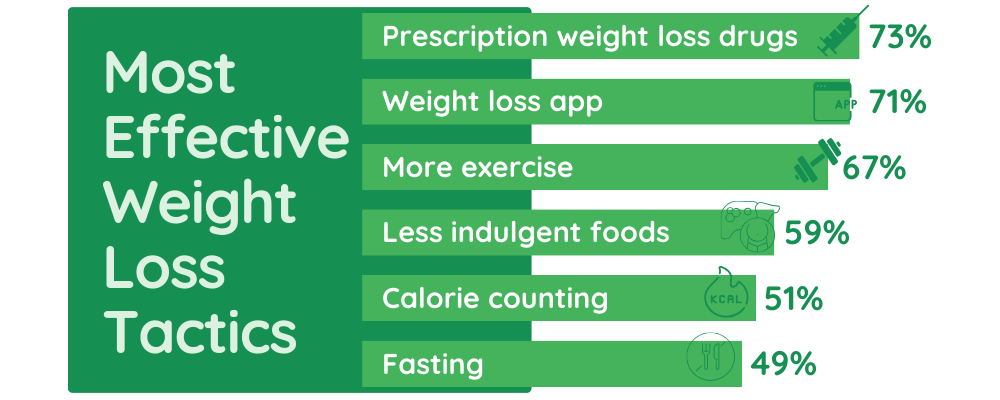How To Lose Weight And Keep It Off
Table of Contents
Why do you want to lose weight?
Losing weight can bring numerous health benefits and improve your overall quality of life. Understanding your motivation for weight loss can help you stay committed to your goals and maintain a healthier lifestyle.
Losing weight can help:
- Reduce knee and back pain: Carrying excess weight puts extra strain on your joints, particularly in your knees and back. Losing weight can alleviate this pressure and reduce pain.
- Stop you feeling out of breath: Excess weight can make physical activities more challenging and leave you feeling breathless. Weight loss can improve your stamina and make daily activities easier.
- Keep your heart healthy: Being overweight increases your risk of heart disease. Weight loss can lower your blood pressure, reduce cholesterol levels, and improve overall cardiovascular health.
- Allow you to walk further: Shedding excess weight can boost your energy levels and increase your mobility, allowing you to walk longer distances without discomfort.
- Make you feel better about yourself: Achieving weight loss goals can enhance your self-esteem and body image, leading to a more positive outlook on life.

Why should I make some changes to my diet?
Making changes to your diet is crucial if you are overweight. Excess weight can lead to a range of health issues, and dietary adjustments can help mitigate these risks and improve your overall well-being.
If you are overweight:
- Walking can be difficult: Carrying extra weight can make walking and other physical activities more challenging and uncomfortable.
- You may feel out of breath: Extra weight can put pressure on your lungs and make breathing more difficult, especially during physical exertion.
- You can get high blood pressure: Being overweight is a major risk factor for developing high blood pressure, which can lead to serious health complications.
If you are overweight you might get pain in your hips, back, and knees:
Excess weight can put undue stress on your joints, leading to chronic pain and discomfort in your hips, back, and knees.

If you are overweight, you might get:
- Heart diseases: Excess weight increases the risk of developing heart diseases, including coronary artery disease and heart failure.
- High cholesterol: Being overweight can lead to elevated cholesterol levels, increasing the risk of heart attacks and strokes.
- Diabetes: Overweight individuals are at a higher risk of developing type 2 diabetes, a condition that can lead to severe health complications if not managed properly.
- Some cancers: There is a higher incidence of certain cancers, such as breast, colon, and kidney cancer, among overweight individuals.
- Stroke: Excess weight increases the risk of strokes, which can cause long-term disability or even death.
What should we do to stay healthy?
To stay healthy and support weight loss, it is important to eat the right foods and stay active through regular exercise.
Exercise:
Aim for at least 30 minutes of activity a day. This does not have to be at the gym; many activities count, such as:
- Walking or jogging
- Cycling
- Swimming
- Dancing
- Playing sports
- Gardening
- Taking the stairs instead of the lift
Eat regular meals:
Eating regular meals can help control your appetite and prevent overeating. Skipping meals can lead to increased hunger and potentially unhealthy food choices later in the day.
Eat a balanced diet with food from each food group:
- Fruits and vegetables: Aim to fill half your plate with fruits and vegetables. They are low in calories and high in fiber, which can help you feel full longer.
- Whole grains: Choose whole grains like brown rice, quinoa, and whole wheat bread over refined grains to increase your fiber intake and maintain steady blood sugar levels.
- Lean proteins: Incorporate lean protein sources such as chicken, fish, beans, and legumes to support muscle maintenance and repair.
- Healthy fats: Include sources of healthy fats, such as avocados, nuts, seeds, and olive oil, to promote satiety and provide essential fatty acids.
Aim for one-quarter of your plate at main meals to be bread, rice, pasta, potatoes, or other starchy carbs. These provide essential energy and nutrients to fuel your body throughout the day.

The first steps to lose weight:
Starting your weight loss journey can feel overwhelming but breaking it down into manageable steps can help you stay on track.
Stepping stones:
- Set realistic goals: Aim for a modest weight loss of 5-10% of your current weight initially, which can lead to significant health benefits.
- Create a meal plan: Plan your meals and snacks ahead of time to ensure you make healthy choices and avoid impulse eating.
- Track your progress: Use a journal or a mobile app to monitor your food intake, physical activity, and weight loss progress.
- Stay hydrated: Drink plenty of water throughout the day to stay hydrated and support your metabolism.
- Seek support: Join a weight loss group or seek support from friends and family to stay motivated and accountable.

Portions
Understanding portion sizes is crucial for managing your calorie intake and achieving your weight loss goals.
What is a portion?
A portion is the amount of a specific food that you choose to eat for a meal or snack. It is important to be aware of portion sizes to avoid overeating. Many food packages provide serving size information on the nutrition label, which can help guide your portion choices.
Where to find it on packaging:
Look at the nutrition label on food packaging to find the recommended serving size. This will be listed in grams, ounces, or common household measures such as cups or pieces. Comparing your portion to the recommended serving size can help you stay within your calorie goals.
Final tips and motivation
Losing weight and keeping it off is a journey that requires dedication and consistency. Here are some final tips to help you stay motivated:
- Celebrate small victories: Acknowledge and celebrate your progress, no matter how small. Every step forward is a step towards better health.
- Stay positive: Focus on the positive changes you are making rather than dwelling on setbacks. Maintaining a positive mindset can help you stay motivated.
- Get support: Surround yourself with supportive friends, family, or a weight loss community to share your experiences and stay encouraged.
Statistics:
- According to the NHS, losing just 5-10% of your body weight can significantly reduce the risk of obesity-related diseases, such as type 2 diabetes and heart disease.
- Regular physical activity can reduce the risk of chronic diseases, including cardiovascular disease, by up to 30%.
By making small, sustainable changes to your diet and exercise routine, you can achieve your weight loss goals and enjoy a healthier, happier life.


